
The Roche LGBTQ community is an important and lasting legacy of our culture. They make up the vibrant tapestry of diverse voices that allow each of us to thrive at the workplace and pursue a purpose-driven life. Now more than ever, it is critical to listen to their stories in order to support inclusion and become better allies. In honour of Pride Month, a handful of our employees share their experiences and hopes for the future.
The importance of having allies
André Bertomeu works in Roche Medical Affairs, Brazil and is the chair of the OPEN* network that believes in the value of working with allies to expand awareness of the LGBTQ+ community. He also talks about a recent win in his country.
“We can only hope for real change if everyone is committed to taking a stand. An ally is anyone who supports the LGBTQ+ community and their active voices and actions are essential in helping others understand the challenges faced by the LGBTQ+ community and support equality.
Reaching out to people who don't have a connection to the LGBTQ+ community to discuss our issues is a big challenge. Usually, our activities attract people who are already sensitised. However, we are always looking for ways to expand the debates and I believe that allies are the cornerstone in doing that. Allies also play an essential role in attracting more diverse talents, for instance to big companies such as Roche, as they will often be decision makers in talent acquisition.
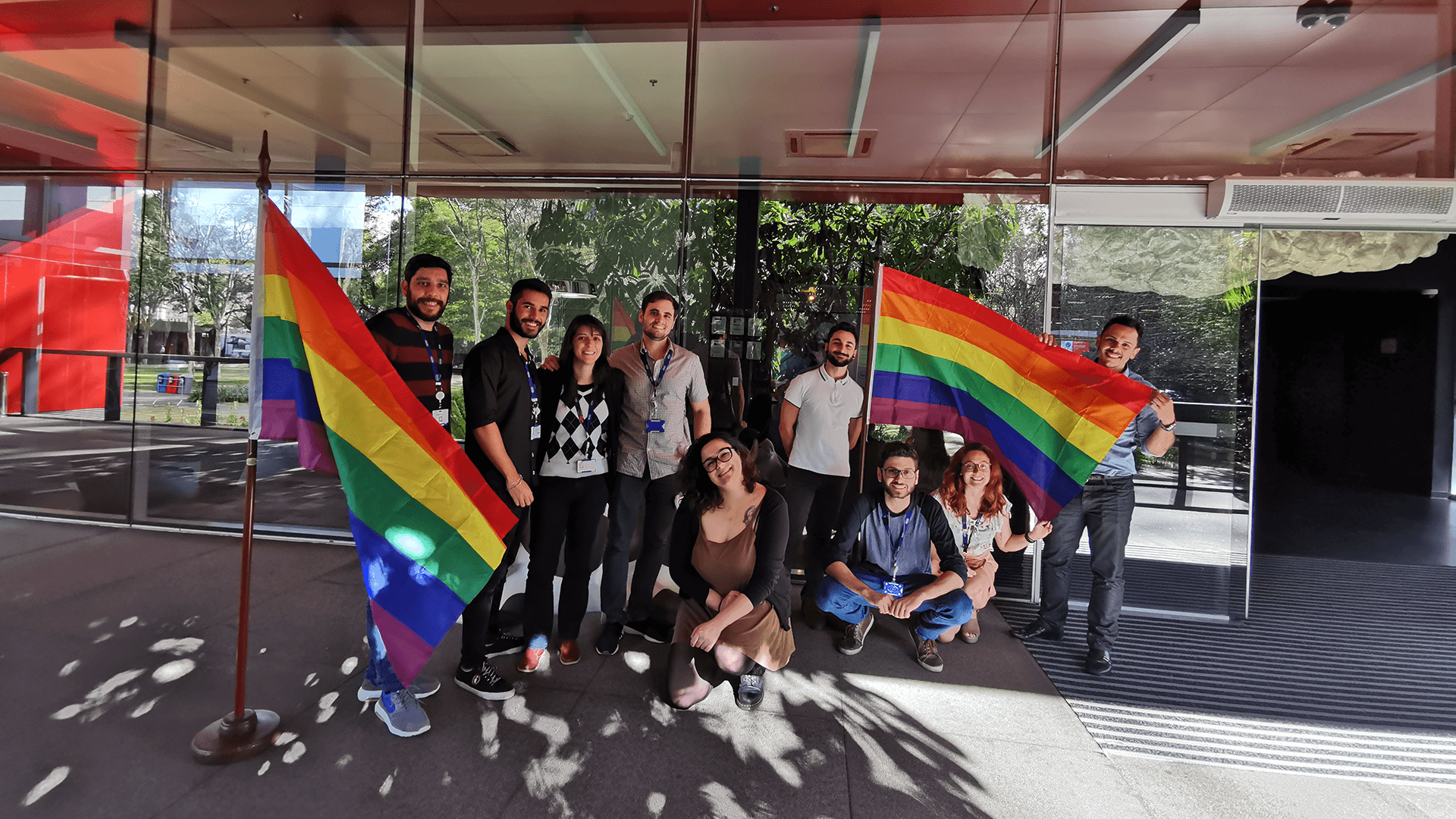
Social and political background
Brazil is a country of contradictions when it comes to LGBTQ+ matters. While we have the biggest pride celebration in the world with an estimated 3 million people having attended in 2019, we are also the country with the highest violence rates against the community.
We are a polarised country with huge social inequality and that some, including transgender and black people, are hit much harder. On the other hand, social movements are getting bigger and more organised and LGBTQ+ rights have evolved significantly in recent years with joint adoption and same-sex marriage being legalised.
The pandemic effect
We had big plans for OPEN this year, with participation confirmed in equality events, a global summit and many initiatives ongoing locally that could potentially have a positive impact for LGBTQ+ community. With the onset of the pandemic, we had to change many of our plans. With each cancellation of an event and our inability to continue with an initiative, came more frustration and anxiety.
I was amazed l to see how our OPEN team found strength in looking for creative and empathic solutions. Good examples of that are the iBuddies (an initiative to connect Roche LGBTQ+ communities members and allies around the world in informal conversations to discuss the reality of the community in their homes), the OPEN global virtual summit held in May and the full engagement of our members in re-defining the way we work in the current scenario. Another achievement that made us really proud was the release of the rainbow flag Roche logo in support of the pride month activities this June.
A bit of good news
We also had some good news on a national level. On May 9th, Brazil’s Supreme Court overturned rules that limited gay and bisexual men donating blood. This is an important victory for human rights and for patients in need at a time when blood donations have declined significantly due to the pandemic.”
Huge strides taken
Laura Lange is Senior Global Project Manager in the Personalized Healthcare Center of Excellence based at Genentech, South San Francisco. She shares two stories that highlight progress made at Genentech on issues concerning the LGBTQ+ community, thanks to support from engaged allies.
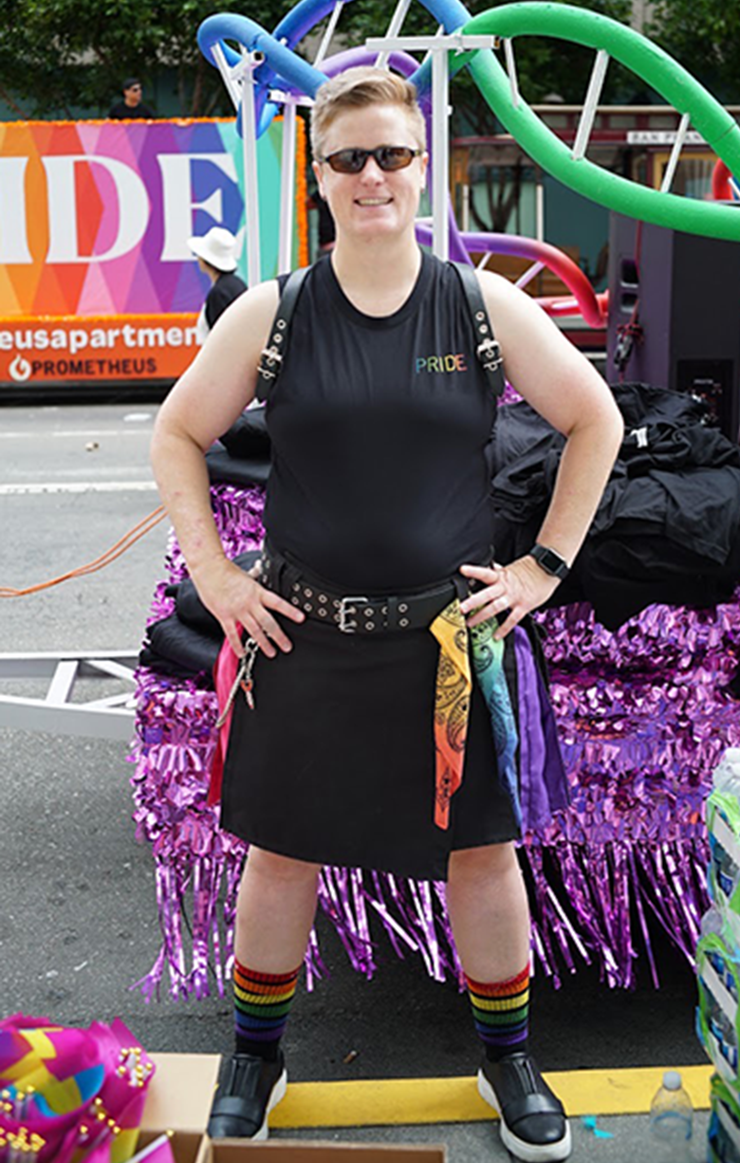
"In May 2019, Genentech for the first time shared a detailed breakdown of diversity data with all employees. While the data showed that we’ve come a long way in gender representation for the LGBTQ+ community, it did not represent our whole community as it was assigned to the typical binary men/women categories with no allowance for other types of non-binary identification. Research has shown that young people entering the workforce will identify as genderfluid or non-binary at a higher prevalence than generations before them, so changing the way we collect data would be essential in helping all of us feel like we work at an inclusive workplace.
Three years ago, together with a co-chair of gPRIDE – a Genentech diversity network association that fosters inclusion and empowers community members to advocate for civil and human rights – I began to lobby the company to gather LGBTQ+ data. In 2019, leaders responded by expanding voluntary self-identification to include gender identity and sexual orientation for Genentech and Roche employees in the US.
An important ally
Our CEO Alexander Hardy also created a new position of Genentech’s first Chief Diversity Officer (CDO) in his management team. He appointed Quita Highsmith, a longtime supporter and ally of the LGBTQ+ community. Quita is working to foster belonging, advance inclusive research and health equity, and transform society as part of the company’s diversity and inclusion strategy.
Recently, she increased her scope for advancing inclusive research and pledged to help transform society by including LGBTQ+ in this initiative. There are disparities, physician biases and issues with accurately recording gender identity and sexual orientation in electronic medical records among members of the community. The key again is to collect more data in order to close that gap. As a strong ally, Quita has made it her mission to focus on this and include our community in this initiative moving forward.”
Two sides of the coin
William Haylett is Research and Early Development Scientist at Roche Diagnostics in Cape Town, South Africa. He shares how his country has a splintered attitude towards the LGBTQ+ community.
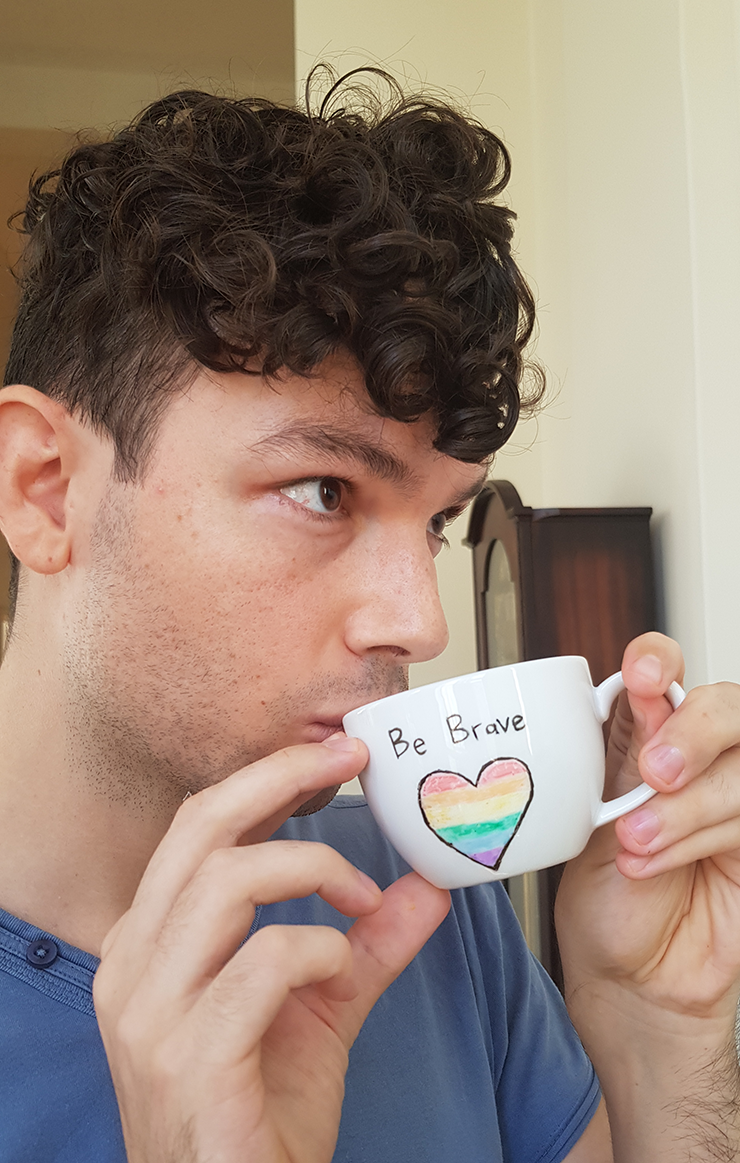
“On paper, South Africa is a beacon of LGBTQ+ rights. It is the first country in the world to enshrine protection against discrimination based on sexual orientation and gender identity, in the most progressive constitution of its time. It is the fifth country in the world (and only nation on the African continent) to legalise same sex marriage in 2006. However, there is an awkward disparity between the noble aspirations of our post-apartheid policies and the lived experiences of ordinary South Africans, where misconception of LGBTQ+ issues and vilification of LGBTQ+ individuals are all-too-common.
The two sides of this coin are illustrated by a 2015 nationwide survey, which reported that while 51% of South Africans believe that gay people should have the same human rights, a disheartening 72% feel that same-sex acitivity is morally wrong. This is perhaps not unexpected as South African society, while diverse and complex, is overwhelmingly religious, patriarchal and morally conservative. In addition, traditional concepts of masculinity often result in homophobic violence and abuse, with 44% of LGBTQ+ South Africans reporting to experience verbal, physical and/or sexual abuse in their daily lives due to their sexual orientation. Clearly, constitutional protection makes little difference when you are threatened with corrective rape or gay bashing, or when you are abandoned by friends and family under the guise of 'love the sinner, hate the sin'.
Different personal experience
That being said, this gloomy picture is not my personal experience. Living in an affluent, historically white neighborhood in Cape Town, I rarely have to think twice about being out in public. I live in the Gay Capital of Africa, with dedicated nightclubs, film festivals and pride events. I hold my fiancé’s hand while walking down bustling streets. On our way to work, he drops me at the entrance to the Roche site; I get a goodbye peck on the cheek. I openly speak about our wedding arrangements at work.
This comfort to be so visible is in part due to Roche’s commendable culture of inclusivity. In part it is due to my familiarity with South Africa’s progressive anti-discrimination legal framework, which gives me recourse as an LGBTQ+ employee. Mostly it is because I am a white, upper middle class, cisgender man, and the social clout that it produces is carried like a shield. I am privileged to live in a social bubble where being gay is a non-issue. This is not so for many black, poor or even homeless LGBTQ+ individuals who are also part of 'gay-friendly' Cape Town.
It is ironic that I have a voice, rather than more socially disadvantaged LGBTQ+ individuals who are desperate to be heard. My Out and Proud life is easy, boring even, and for that I am thankful. The most discrimination I face are occasional whispers of 'moffie' (an Afrikaans gay slur) from passers-by, and for that I’m also thankful, because I forgive their ignorance and move on, unaffected. I hear stories of less fortunate communities just outside my social bubble, where vocal taunts of 'moffie' are often preludes to harassment and violence.”
Policies based on prejudice and not science still exist
Mike Wierzba, Manager, Regulatory Affairs, Roche Tissue Diagnostics, is the chair of the OPEN* Group at the site in Tucson, Arizona in the US. He talks about challenges the community faces during times of COVID and the importance of having allies.
“While we are all challenged with the current COVID situation and the strain it puts on our ability to interact socially, as well as heightening our anxieties, members of the LGBTQ+ community may be particularly sensitive at this time. For those of us who felt socially isolated as children – who weren’t accepted or didn’t fit in, the distancing of our social circle may trigger associated emotions to these past experiences and add to what we are already dealing with. I also see elders in the community who are on their own, without close family, and at higher risk to their health from an infection. Those of us who lived through the initial AIDS crisis undoubtedly see parallels with the COVID pandemic and corresponding fears and unknowns.
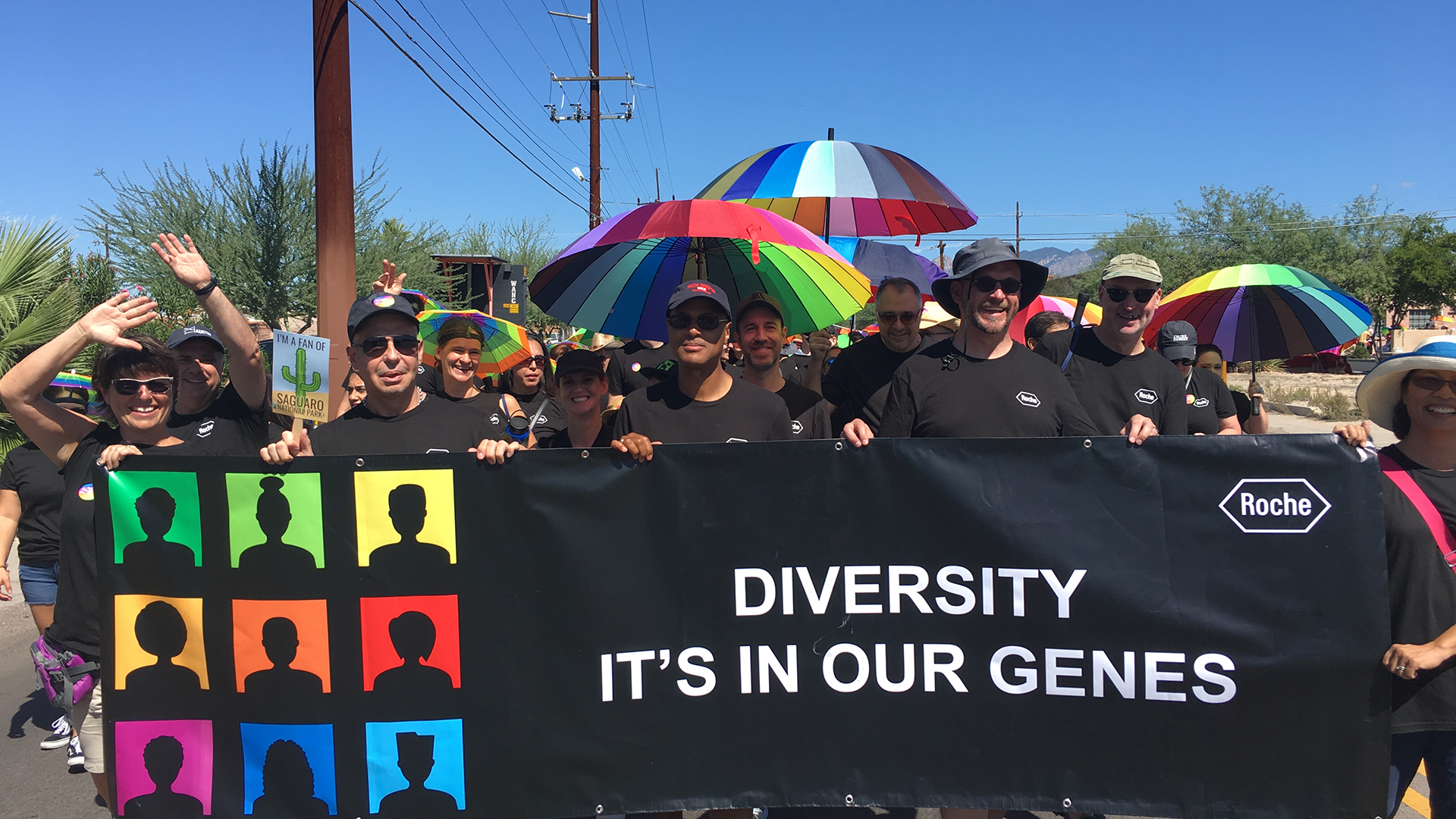
At the Roche Tissue Diagnostics Vivid OPEN group, we are fortunate to include many allies. For some of these allies their involvement is personal, because they have a child, parent or other family member that is LGBTQ+. It’s this personal connection that motivates their contributions to making our workplace and community more inclusive. It’s this sense of inclusive community that helps me focus on my work without the distracting anxieties of worrying about others’ prejudices.
Restrictions on blood donation
I am proud to see the contribution Roche Diagnostics is making in COVID testing, which could allay some of these heightened fears. I also see areas where the importance of quality diagnostics can have further impact. Despite the innovation in HIV and blood safety testing, some countries such as the UK and US still put restrictions on blood donation by men who have sex with men. In response to the COVID pandemic, restrictions have been reduced from 12 months without sexual contact to three months. However, I still can’t help but feel discriminated against by a society where policies such as these still exist that are based on prejudice and not science.
Working in this industry it would be great to see how the expertise in diagnostics at Roche can help educate and inform policies to be more inclusive and recognise how modern, quality diagnostic testing mitigates the perceived risks.
I look forward to the synergy of #RochePride AND #RocheProud!”
It’s hard to win a war without allies
Iain Gowers is a Technical Support Analyst in Roche Diagnostics, Burgess Hill, UK and leads the OPEN* group in the UK. He reflects how grateful he is to have allies who help grow the LGBTQ community with their direct involvement and support.
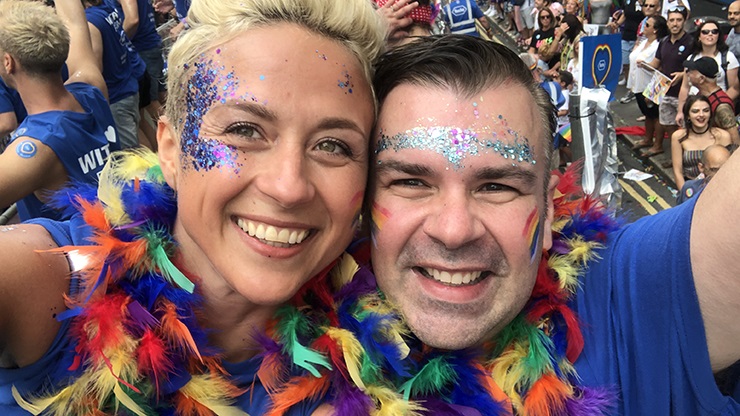
The Burgess Hill site is within a small town 8 miles north of the city of Brighton. Brighton & Hove is generally agreed to be the unofficial "gay capital" of the UK. Most employees at Burgess Hill, therefore, have a direct connection or experience with the local LGBQT+ community and events.
Iain Gowers with friends at Pride
We are such a diverse site where are LGBTQ+ people spread out across all of our departments, because of that people wanted to be able to come together more often and have a place to discuss things like the Orlando shootings, the rise of hate crimes and homophobic comments that happened after the Brexit vote came through. I went to London Pride the day after the Brexit vote which was really topical and saw other pharma companies.
That’s where we started. It was fairly easy to set up here and members were extremely keen when it comes to our entry in Brighton & Hove Pride, the largest Pride event in the UK that attracts over 500,000 viewers. We have been involved since 2017 and were the first Roche site to be in a pride parade.
I wouldn’t have been able to start the OPEN group in Burgess Hill without the help of allies. I relied on them to pass the invite around for the first meeting, making sure that those LGBTQ+ staff directly got the invite. Our allies are an integral part of the group, running socials and directly being involved with pride. We couldn’t have won that war without them.
One of the hardest things this year has been the cancellation of all the UK pride activities, we had planned to be at the Brighton pride and also in London. We also don’t know what LGBTQ venues will survive the COVID–19 shutdown, but we are determined to support them. The date for Brighton Pride 2021 was announced shortly after 2020 was cancelled. We decided to give everyone something to look forward to and shared it… so see you on Saturday, August 7, 2021!
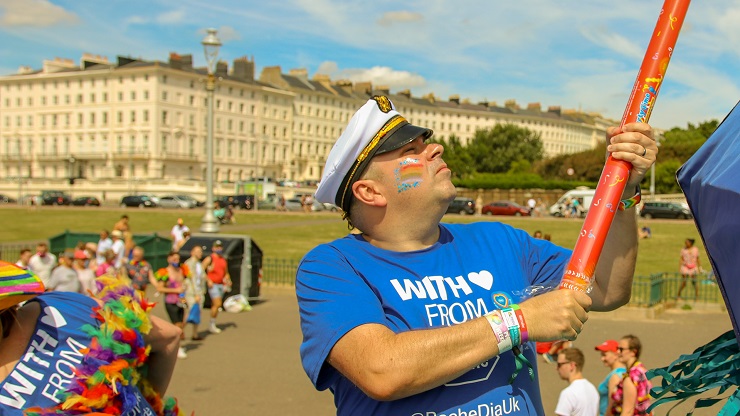
UK laws on Blood donation
Since November 2017 gay men have been able to donate blood providing they have had a 12-month period of abstinence. There is a move to change that to three months, but this has been under review for over two years.
We had a blood bank drive and a colleague asked me if I was going to donate. I stood there uncomfortably not knowing how to respond. It was a really personal question and asked with no ill-meaning. Fortunately, some colleagues understood and explained, very quickly a discussion started that this is unnecessary as we have the technology to detect HIV in any donated blood and abstinence is not needed.”
*OPEN is a LGBTQ+ group within Roche, fostering an inclusive workplace for all sexual orientations, gender identities, and gender expressions.
Iain taking part in Pride
You might also be interested in

Diversity
We are inclusive. We respect cultural differences. And we encourage the richness of ideas and approaches that diversity brings.

